- Admission
- Discover Episcopal
- Our Program
- Athletics
- Arts
- Spirituality
- Student Life
- Support Episcopal
- Alumni
- Parent Support
- Knightly News
- Contact Us
- Calendar
- School Store
- Lunch Menu
- Summer Camps
« Back
Episcopal Educators Navigate the Future: How AI and Chatbots are Transforming Education
October 12th, 2023
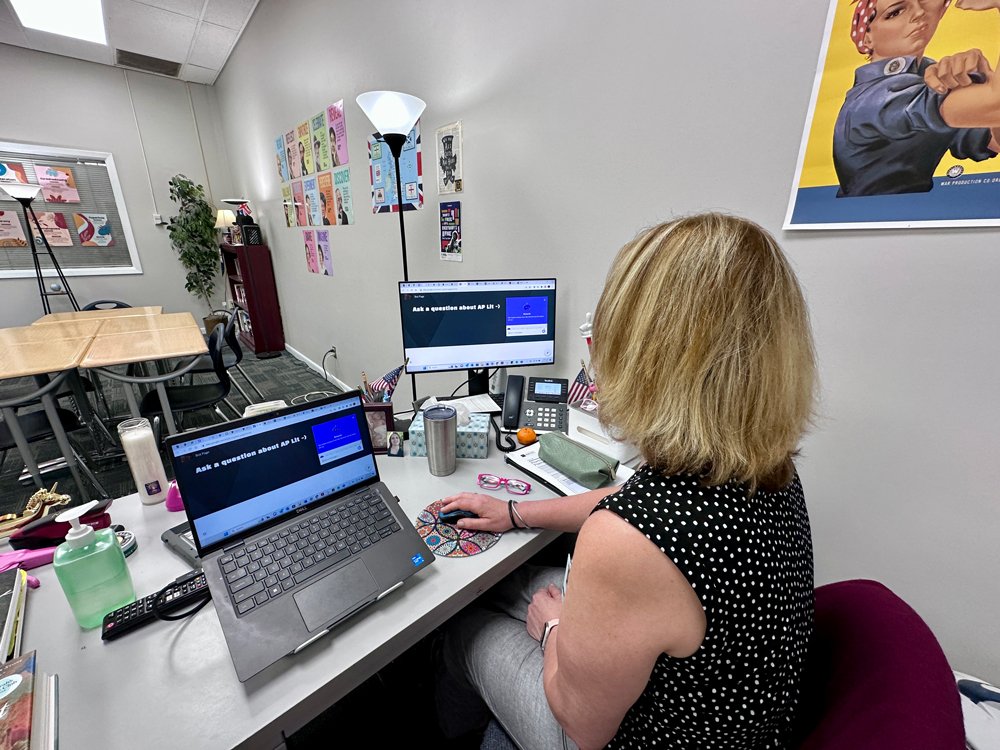
As Google celebrated its 25th birthday last month, I remembered how the search engine transformed teaching and learning. I, a fledgling teacher in her twenties, embraced the technology and discovered ways to enhance student research, writing, and sharing abilities online. However, some veteran educators remained cautious. Could this herald the end of independent thought and study? How will we deal with plagiarism? Will I be out of a job?
Today, I am one of the veteran teachers facing new, game-changing technology: AI and chatbots such as ChatGPT have entered the scene, potentially creating a sea-change in classrooms worldwide. As an English teacher, I grappled with questions regarding academic honesty and student creativity. However, acknowledging that this is just the beginning and AI is here to stay, I decided to dive straight in, attending several flip-flop professional development sessions at Episcopal over the summer, presented by Brandi Bergeron, our Academic Technology Coordinator. My colleagues and I learned about Curiopod (AI-generated presentation slides), Parlay (an AI facilitator of class discussions), and ChatGPT (a generative AI chatbot).
Some of us continued our study of AI by reading two thought-provoking books about the application of AI in teaching and learning: The AI Infused Classroom by Holly Clark and Teaching AI by Michelle Renée Zimmerman. Clark, who wrote the book with the aid of AI, fosters a future-oriented approach where AI is simply the next step on the road of educational technologies and exceptional pedagogy. Zimmerman’s work helps readers understand that while AI may seem overwhelming, it has been part of our lives for a considerable time. Consider the “Can I help you?” widgets on some retail sites, for example, or the first chatbot (ELIZA), created in the 1960s. I realized that ChatGPT, though shiny and new and somewhat intimidating, put down its roots decades ago. This better understanding of how AI functions and developed afforded me the confidence to use it to enhance students' readiness for a world that is already awash with artificial intelligence and all its social and cultural implications.
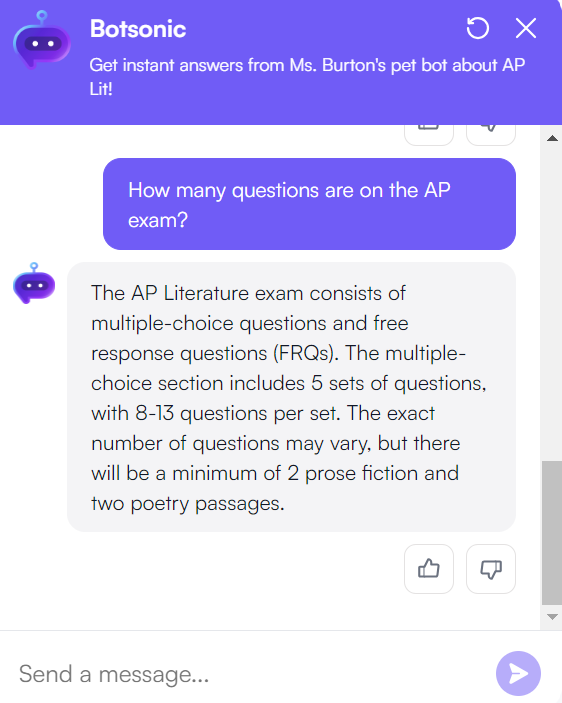
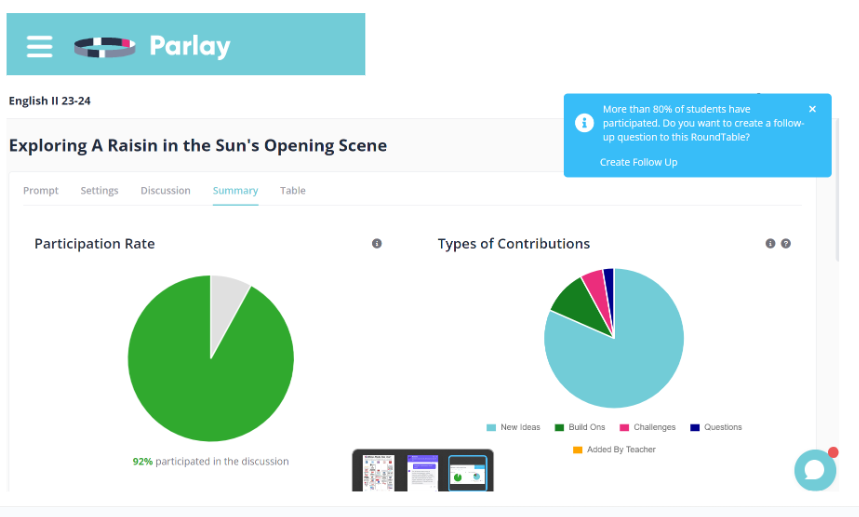
ChatGPT is a fascinating and cutting-edge language processing tool capable of generating text on various topics. I was particularly interested in its potential to enhance students' writing skills and elevate the quality of my instruction as an ELA educator. I recognized that students are already familiar with ChatGPT and might feel tempted to use it unethically. I showcased its legitimate applications and highlighted the importance of using it ethically and responsibly. I demonstrated how ChatGPT can serve as a valuable resource for brainstorming and generating ideas before diving into the writing process. This way, students could apply its capabilities while maintaining the integrity of their academic work. AI has flaws; students should always fact-check any generated content.
I have conversed with ChatGPT to brainstorm ideas for lesson plans, create engaging activities, and design assessments and rubrics. It is not perfect, however, and teachers must still review and tweak responses to align with their students' needs. ChatGPT has also enhanced my feedback on student writing: AI, via Grammarly or chatbots, can focus on grammar, mechanics, and nuts and bolts, leaving me valuable time to offer more focused commentary on individual nuances such as tone, voice, content, and analysis. I began to consider how I could harness the power of a chatbot to convey data to students. I created a bot to answer FAQs 24/7 from students about a course. With the help of BotSonic, my chatbot about AP Literature for beginners or those thinking of taking the course was born. This way, I can control the information students receive and ensure it is correct and up-to-date. I’m testing it on my current AP students for their feedback, and I hope to have it up and running soon.
*As technology continues to advance and shape the landscape of education, teachers, both seasoned and new, are faced with an evolving set of challenges and opportunities. The journey from the emergence of search engines like Google to the present-day introduction of AI and chatbots like ChatGPT is a testament to the ever-changing nature of the educational environment.
*To demonstrate the power of AI to those unfamiliar, I asked ChatGPT to pen my concluding paragraph (ChatGPT, prompt "Write a conclusion" October 11, 2023, OpenAI, https://chat.openai.com).

Dawn Burton comes to Episcopal with a global perspective having taught in Belgium and China. Over the course of her 23 year career she has taught a range of English courses. Dawn is passionate about educational technologies and in 2017 received first prize in The Henry Ford “Innovation Nation” Teacher Innovator of the Year awards. Most recently, Dawn was the English Department Chair and Innovation and Design Lab Facilitator at St. Joseph’s Academy in Baton Rouge. She earned her Bachelor of Arts degree with honors in English Literature and Classical Studies from the University of Liverpool, UK; she later achieved a Postgraduate Certificate in Education (Secondary English) and a Master of Arts degree in Education (Leadership and Management) from the Open University, UK. Dawn is fluent in French and Dutch. She is married to Zach and is the mother of Hannah and Isabel.
The Episcopal School of Baton Rouge 2025-2026 application is now available! For more information on the application process, to schedule a tour, or learn more about the private school, contact us at [email protected] or 225-755-2685.
Other articles to consider
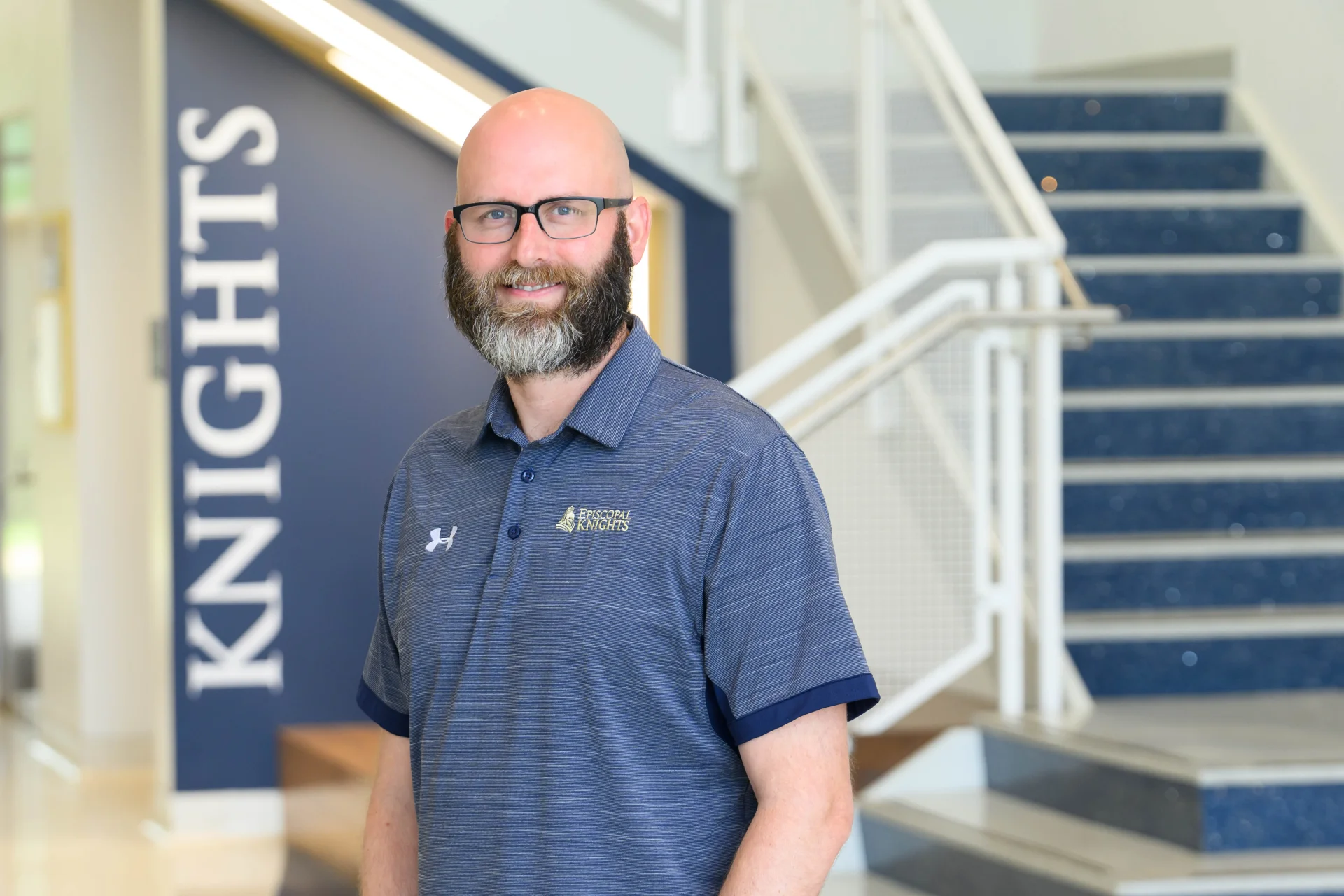 Jun5Episcopal Announces New Athletic Director
Jun5Episcopal Announces New Athletic DirectorPlease join us in welcoming Brent Broussard to the Episcopal community.
See Details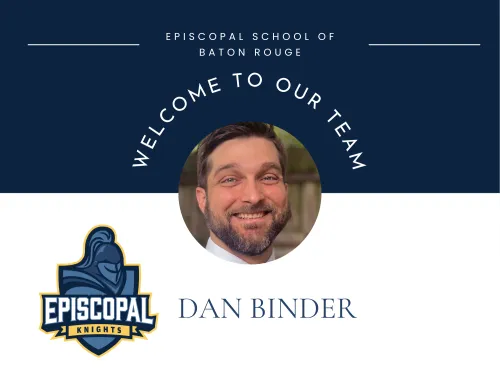 Jun2Episcopal Welcomes Dan Binder as the Next Upper School Division Head
Jun2Episcopal Welcomes Dan Binder as the Next Upper School Division HeadPlease join us in welcoming Dan Binder to the Episcopal community.
See Details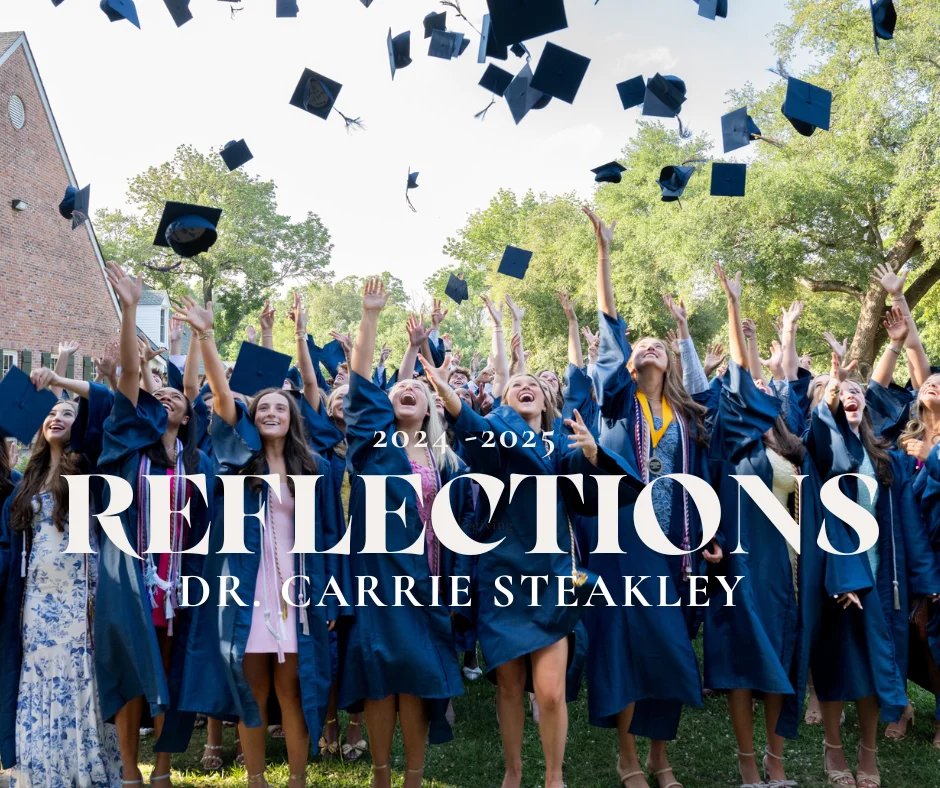 May22End of the Year Reflection from Dr. Steakley
May22End of the Year Reflection from Dr. SteakleyAn Episcopal education and the community that supports it are remarkable. Dr. Steakley looks back at the moments that made the 2024/2025 school year.
See Details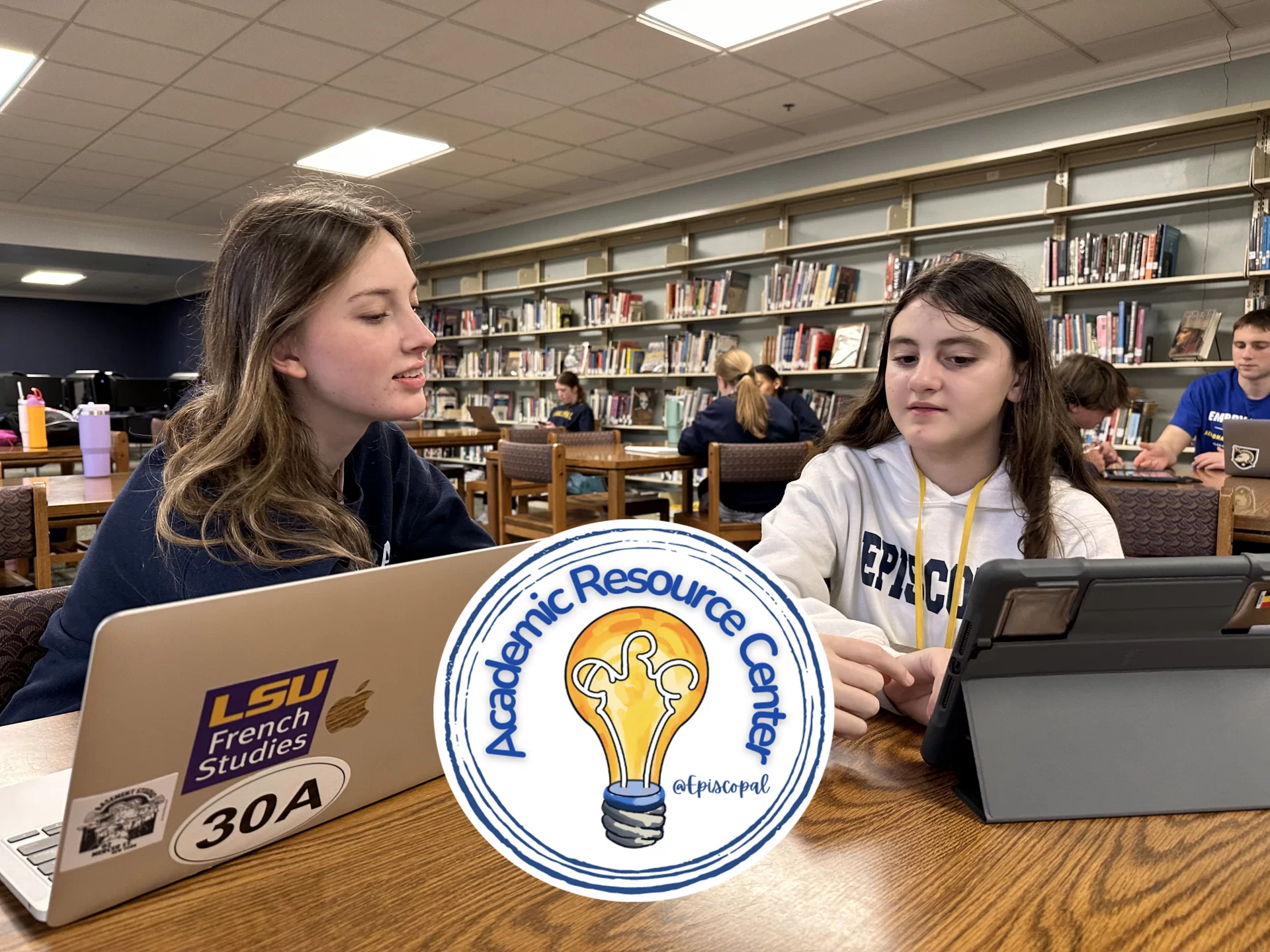 May12Tutoring with a Purpose: Jackson Ezell Reflects on His Time in the Academic Resource Center
May12Tutoring with a Purpose: Jackson Ezell Reflects on His Time in the Academic Resource CenterTime as an ARC Fellow boosts student confidence, encourages friendships and fosters lifelong learning habits. Senior Jackson Ezell reflects on his transformation as a tutor and the transformation of the center from Writing Center to Academic Resource Center.
See Details
Categories
- All
- Admission
- Athletics
- College Bound 2019
- College Bound 2020
- College Bound 2021
- College Bound 2022
- College Bound 2023
- College Bound 2024
- College Bound 2025
- Counselors Corner
- Episcopal Alumni
- Giving
- Head Of School
- Lower School
- Middle School
- Spirituality And Service
- Student Work
- The Teachers' Lounge
- Upper School
- Visual And Performing Arts











